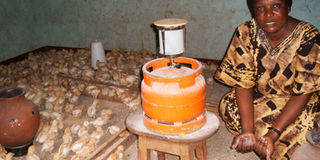Muyobo is fighting poverty by rearing local chicken

Zainab Muyobo attends to her chicks in Manafwa District. PHOTO BY Fred Muzaale
What you need to know:
- Indigenous chickens play an important role in the livelihoods of most rural families and Zainab Myobo can testify to this. She shares her story with David Mafabi.
There is a gold mine in rearing local chicken and 54-year-old Zainab Muyobo has tapped into it.
Muyobo, who is spearheading the campaign to encourage people in Manafwa District to rear local chicken, has a one acre piece of land in Bugobero, Bugobero Sub-county in Manafwa District which she has utilised it for farming and local chicken rearing under the National Agricultural Advisory Services (Naads) progamme.
The scene outside her house as you approach the village is modest but when you enter the compound, the chicken rearing business speaks volumes about the wealth hidden in local chicken rearing.
“Well, we have not been so poor but ever since we started the local chicken business, there is significant change. We started off with about 50 birds but right now, we have more than 400 local birds. On top of training other farmers, we supply the local chicken, says Muyobo.
The proceeds from these projects is what the family has used to take their children through school as well as improve their livelihood.
Start up
Muyobo says she got the initial 300kg of maize bran, 30 kg of fishmeal, drugs and vaccines and a chain link as a startup capital from Naads. with the knowledge in management from Naads.
“This was the only input I got besides the knowledge and now I am able to meet all the costs on my own without going back to Naads but of course they keep monitoring the projects, teaching and to encourage other farmers to take on,” said Muyobo.
Under Manafwa Naads programme, farmers are encouraged to rear local chicken and are given extensive services to manage them in addition to market improved strategies.
To increase her income generation, Muyobo also grows banana, grafted oranges and mangoes to fight poverty in her home.
Everything on the farm is useful
Muyobo says the chicken droppings collected daily have enabled her get free manure for her gardens where she has also embarked on banana growing.
“I have had the opportunity to get the free chicken droppings from my farm as manure to fertilise the soil in my gardens to boost crop production in my banana farms, this means everything at the poultry farm is useful to the farmer,” says Muyobo.
She has dedicated her time to manage her local chicken and fruits business that profit the family.
With hard labour and considerable skills attained from Naads trainings, Muyobo oversees the entire process that involves managing and selling quality local chicken destined for markets within the district and beyond.
Costs
Muyobo says she does not go out to look for market for the local chicken but customers find her in the comfort of her home. She earns about Shs500,000 weekly from the sale of local chicken and eggs, which has enabled her transform herself from a poor rural farmer to a model one for other rural famers.
Muyobo says as a poultry farmer she has gained a lot more money from the sale of local chicken eggs. Local chicken normally begin laying eggs after about five months and have a long laying period during which time a farmer will sell the eggs and leave the manageable ones for hatching into chicks.
Management practices
Although the chicken are local bought within the community, Muyobo says her chicken undergo nine different vaccinations, the chicken houses must be disinfected every time new birds are brought in.
She further says that even visitors on the farm are limited because some of the diseases could be transmitted by humans and adds that even during feeding, she is particular on the type of people who feed her birds.
“Once hygiene is kept to avoid disease on the farm, and enough food and water is given, one can be sure of collecting over 100 eggs daily from about 200 chickens,” says Muyobo.
Facts about indigenous chickens
• Meat and eggs are tastier and preferred by most consumers to those obtained from commercial breeds
• Initial investment is less than that needed to keep commercial breeds
• More tolerant of harsh conditions, including diseases, than commercial breeds
• Can be fed on cheap, locally available feeds
• When allowed to range freely, they need little feeding or other care
• Women and youth often control income from chickens
• Local markets are readily available for both eggs and chickens
• Droppings are rich in nutrients: can be used for compost making, pond fertilising and as feed for livestock.




